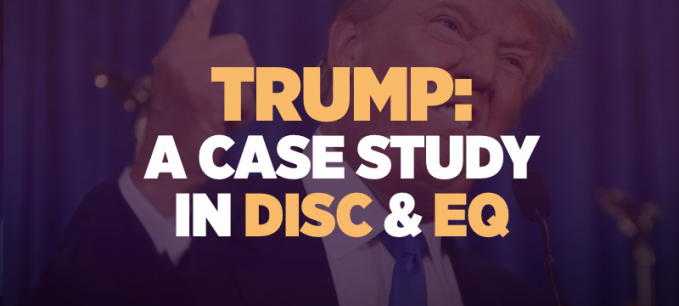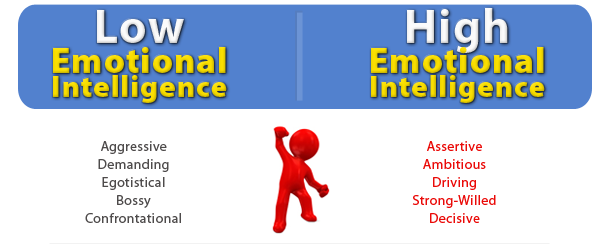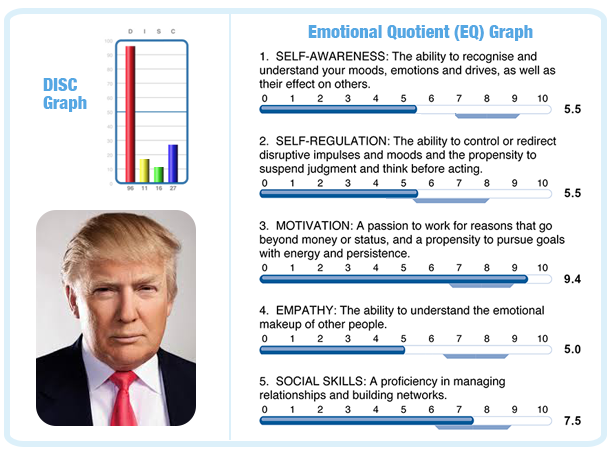Trump: A Case Study in How EQ Impacts DISC

When it comes to the DISC assessment, there are few better examples of a “core” dominance (D) style than The Donald. People with a high D behavioural style are often described as:
- Assertive
- Competitive
- Direct
- Decisive
- Challenging
- Pioneering
Clearly, Trump ticks all the boxes for D tendencies.
But a lot of people tick all the boxes for D tendencies — yet, they aren’t as fiercely disliked as Trump.

Two people can share the same DISC pattern and yet come across as completely different people. Consultants who are trained in DISC — and only in DISC — may find this puzzling
How could this be? What accounts for this difference?
Enter emotional intelligence (EI or EQ).
EQ is vital to understand because it forms the basis of social effectiveness and has the power to bring out the best (and worst) traits in our behavioural (DISC) style.

Let’s look at the EQ of Trump using the TTI EQ Model of Emotional Intelligence.
Trump appears to be highly driven, so naturally we would give him a very high score in motivation. Self-awareness and self-regulation, on the other hand, we would argue are lower than average. Empathy; a lot lower. Social skills are more difficult to gauge. There is evidence from Trump's business career that he is skilled at the art of persuasion, influence, and negotiation. However, there is substantial recent evidence showing a repeated pattern of miscommunication; making rambling, confused or incoherent statements; and making offhand remarks that unintentionally damage important political relationships.

Social skills are underpinned by the other four pillars of EQ. Self-awareness and self-regulation — that is, being aware of, and in control of your moods — are essential to good communication. As the saying goes, “Speak when you are angry and you'll make the best speech you'll ever regret.”
The emotion commonly associated with the D style is anger; however, there is a big difference between a high D with high self-regulation and a high D with low self-regulation. This is something that troubles people about Trump: when his ego is rattled, he comes out swinging.
Many coaches and consultants we meet are asked to work with business executives who share the same DISC and EI patterns as Trump. The mistake we see too frequently from these consultants is only acquiring behavioural (DISC) information. Without going deeper than DISC, the consultant won’t be able to recognise the real issues at play. They are like a doctor who lacks the proper diagnostic equipment to help their patient.
Whether you agree with the EQ analysis of The Donald, the point is there is more to understanding the human condition than just learning about one’s behaviours (DISC).
Ultimately, consultants and coaches are beginning to recognise the need to move beyond just focusing narrowly on someone’s behavioural profile and toward building a more complete picture with the use of multiple assessments.

Theo Winter
Client Services Manager, Writer & Researcher. Theo is one of the youngest professionals in the world to earn an accreditation in TTI Success Insight's suite of psychometric assessments. For more than a decade, he worked with hundreds of HR, L&D and OD professionals and consultants to improve engagement, performance and emotional intelligence of leaders and their teams. He authored the book "40 Must-Know Business Models for People Leaders."

/emotional%20%20quotient.png?width=374&name=emotional%20%20quotient.png)
/how%20does%20eq%20%20affect%20your%20%20disc%20profile.png?width=374&name=how%20does%20eq%20%20affect%20your%20%20disc%20profile.png)
We Would Like to Hear From You (0 Comments)